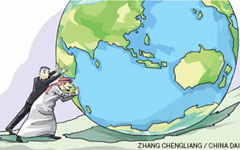A legacy for the future
Updated: 2014-03-18 07:53
By Zhao Huirong (China Daily)
|
|||||||||||
Second, although President Xi has urged the countries involved to enhance policy communication, improve transport connectivity, facilitate trade and investment, promote local-currency trade settlement and strengthen friendly people-to-people exchanges, these will not be easy.
The Silk Road comprises 3 billion people that live in countries with different cultures and national conditions. They will have to seek out common interests and show willingness and determination to overcome their differences. Traffic, trade and currency connectivity are not purely economic issues, they are also related to economic, political and security interests. Without compromises, no agreements will be reached. In addition, there are also some disputes over territory and resources in some parts of the region, which add to the difficulty in forging greater unity.
|
 |
 |
Although the Silk Road economic belt has been proposed by China, its successful implementation needs the strength, wisdom and support of people throughout the region and must be based on voluntary, equal participation and joint construction.
The driving force for the establishment of the Silk Road economic belt is the common interests of regional countries. It is an open cooperation initiative that welcomes the participation of other countries, regional cooperation mechanisms and international financial institutions. Therefore, it will have no exclusiveness, nor target another country, nor will it compete with any other country or replace an existing mechanism.
China needs to strengthen communication with regional countries, take into consideration their concerns, seek common interests and find ways acceptable to all parties to realize these common interests. Russia is an important strategic partner of China and it has important influence in the region, which used to be part of the Soviet Union. China should strengthen communication with Russia, promote coordination between the planned economic belt and the region's existing cooperation mechanisms, and boost cooperation through benefit sharing and compensation. At the same time, cooperation with the United States and Europe should not be excluded.
The author is associate professor at the Institute of Russian, East European and Central Asian Studies, Chinese Academy of Social Sciences.
Related Stories
Cities seek hub status on Maritime Silk Road 2014-03-12 07:28
Silk Road on the sea revitalizes livelihoods 2014-03-10 07:09
A very long and winding silk road 2014-02-17 07:23
Gansu dancers take Silk Road story to Europe 2014-01-27 08:51
China underscores Maritime Silk Road co-op 2014-02-13 20:10
Today's Top News
Thai radar may have detected missing jet
Ukraine rejects Crimea treaty
Tourists to be refunded for smog
Chinese authorities upgrade food waste fight
First lady's visit to boost goodwill
Chinese authorities upgrade food waste fight
Xi to sign flurry of deals in Europe
Li vows not to give up plane hunt
Hot Topics
Lunar probe , China growth forecasts, Emission rules get tougher, China seen through 'colored lens', International board,
Editor's Picks

|

|

|

|

|

|





